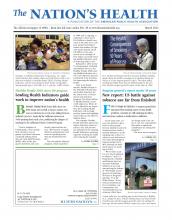Fatal driving crashes involving drugs are on the rise in the U.S., according to a recent study.
Published online Jan. 29 in the American Journal of Epidemiology, the study found that the presence of drugs other than alcohol, such as marijuana, in a driver’s system after a deadly crash increased from 16.6 percent to 28.3 percent from 1999 to 2010.
The study is important because motor vehicle crashes are a major source of morbidity and mortality and a leading cause of death for children and young adults, said study co-author Guohua Li, DrPH, MD, professor of epidemiology and director of the Center for Injury Epidemiology and Prevention at the Columbia University Mailman School of Public Health. Li, an APHA member, said 50 percent of fatal crashes involve drivers under the influence of alcohol, other drugs or both.
“Given that consumption of prescription drugs, primarily opioid analgesics, has been steadily rising, we expected to see an increase in nonalcohol drugs detected in driver fatalities, but were stunned by the magnitude of the increase — the prevalence of marijuana and narcotics tripled during the study period,” Li told The Nation’s Health. “If the trend continues, nonalcohol drugs will overtake alcohol around 2020 to be the most commonly detected substance in traffic fatalities.”
The study looked at more than 23,500 drivers between 1999 and 2010 in California, Hawaii, Illinois, New Hampshire, Rhode Island and West Virginia. Researchers targeted the states because they routinely test drivers for drug use following crashes.
Most of the increase in drugs detected in drivers’ systems was from marijuana and opioids. The prevalence of opioids, such as oxycodone and codeine, increased from 1.8 percent in 1999 to 5.4 percent in 2010, the study said. For marijuana, the increase was 4.2 percent to 12.2 percent in the same period. The presence of alcohol held steady at 39 percent from 1999 to 2010.
Li suggested public health interventions such DUI check points, in which law enforcement stop motorists they suspect are driving while impaired. In the wake of some states decriminalizing marijuana use, the public should be informed of the drug’s effects on driving safety, Li said.
“The epidemic of drug overdose has claimed over 250,000 lives in the U.S. in the past decade,” Li said. “Every sector of the society, particularly the public health community, needs to step up efforts to control this quiet but deadly epidemic. A nationwide prescription drug monitoring program would be a good first step. A national dialogue about the war on drugs and the marijuana legalization movement is much needed.”
For more information, visit http://aje.oxfordjournals.org/content/early/2014/01/27/aje.kwt327.full.
- Copyright The Nation’s Health, American Public Health Association









